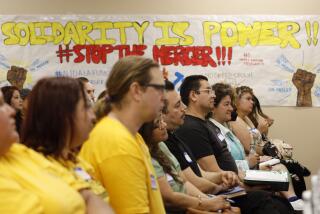Will West and the World Build on Decency, or on Exploitation of Workers?
- Share via
As the Western European nations prepare for integration in 1992, two dramatically different conceptions of the new economic and social order in Europe are taking shape, with important consequences for the world.
All sides perceive that with the Cold War limping to an end and Soviet and Eastern European markets opening up, the prospects for continental economic expansion will be substantial. The question is: What kind of pan-European society will emerge from the coming boom?
British Prime Minister Margaret Thatcher’s vision is of unrestricted freedom for business to invest capital all over the continent. She envisions business inducements, high-rise profits and skyscraper corporations. But she makes no provisions for the progress of Europe’s working people. She imagines a new Europe built like the Eiffel Tower but with a very shaky foundation.
This Europe would look like the Britain of the 1980s, where 10 years of conservative government have increased social disparities and allowed the business class to consolidate extraordinary power over working people. One disturbing trend in Britain is so-called flexibilization, which uses part-time, free-lance, on-call and temporary workers as well as unorganized home workers. By 1985, according to a study by the British government, one-third of all workers and half of all working women fell into this easily exploited non-unionized secondary labor market.
The opposing vision of the new Europe, associated with French President Francois Mitterrand, also includes free markets but insists on a base line of democratic rights for citizens to a livable wage, workplace democracy, adequate health care, excellent schools and decent housing. Having grown up with the sight of the Eiffel Tower, President Mitterrand knows that the base must correspond proportionally to the height if the structure is to endure. Any plan for high-rise profits without a foundational commitment to the working people on whose shoulders the system rests will be doomed to collapse in the first bad wind.
President Mitterrand thus wants to promote a European community that is not just a free-trade zone but an international society whose citizens are committed to a decent life. Competition, yes, but community also. Without a social contract that includes all Europeans, Mitterrand believes that European governments will be driven to try to “outbid” one another for new capital investment by destroying the hard-won gains of working people. Fierce competition for capital, without corresponding protections for labor, will plunge working Europeans into a vicious downward spiral of wage and benefit losses, immigration crises, racial tensions and personal unhappiness.
This downward spiral for working people feared by President Mitterrand has already begun in the United States, where unionized workers struggle to protect their modest gains not only against pressures from right-to-work states, but pressures from oppressive sweatshop nations like Indonesia and Singapore. Meanwhile, 10 years of Republican rule have delivered the pathologies accompanying social polarization: Appalling levels of homelessness and illiteracy, a health crisis for 37 million uninsured Americans, devastation of the nation’s inner cities and a loss of moral values manifested in insider trading, government corruption and drug abuse.
Eyeing other opportunities for a fast buck, many private American corporations now simply want to call off the bargain between business and labor. For example, in 1987 the Pittston Co., which operates mines in the coal fields of Virginia, West Virginia and Kentucky, refused for the first time to be bound by industrywide collective bargaining.
It tried instead to shove down the workers’ throats a Thatcher-type contract, allowing it to sub-contract jobs, eliminate long-established job rights, compel miners to work on holidays and Sundays, weaken health and safety provisions, reduce take-home pay for some workers, extend working hours and reduce health-care benefits, which are crucial to the people who risk their lives underground every day pulling coal from the Earth.
Then Pittston refused to enter into arbitration, later even turning down an offer by the governor of West Virginia to mediate. Their families’ health and livelihood threatened by the rapaciousness of the corporate profiteers, their backs against the wall, the miners went out on strike. More than 2,000 of them have been arrested for civil disobedience. Despite the Thatcherite assault on their rights by the corporate lawyers who Ronald Reagan turned into judges, they have hung in there, true working-class heroes.
But the odds against them are stacked with the Republican-dominated courts and most politicians far more interested in the freedom of capital than the freedom of human beings.
That is why I think President Mitterrand has an important point in his debate with Mrs. Thatcher. If we don’t develop a new social contract that guarantees the rights of labor, then the corporations--in pursuit of profit wherever labor power is weak--are going to roll over working people. Democracies must stop the one-sided class warfare and the economic violence that is being waged by corporations against working people.
I would only take President Mitterrand’s plan for a new social contract one step further. To be effective and to be just, we cannot pretend that what happens in Europe and America affects only Europeans and Americans. For the 21st Century, we need a declaration of basic human rights for workers all over the world.
More to Read
Sign up for Essential California
The most important California stories and recommendations in your inbox every morning.
You may occasionally receive promotional content from the Los Angeles Times.













